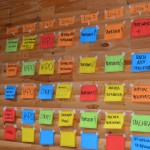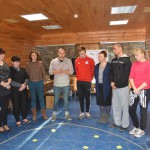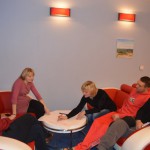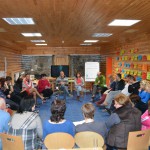Ozolmuižas parish children and youth centre leaders participated in informal training under the Erasmus + programme
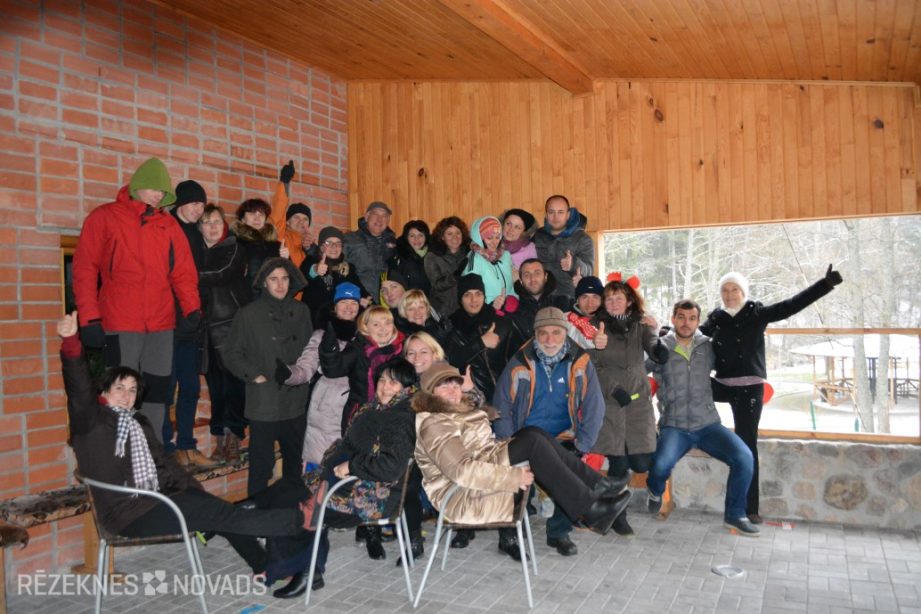
From 19 November to 28 November, the head of the Rēzekne municipality's Ozolmuižas parish child and youth centre, Christine and Rēzekne Football Academy trainer Rihards Ivanovs participated in the Dagda municipality's “Erasmus +” programme “Erasmus +” programme “Use of non-formalities: sport as an instrument for promoting non-formal education”. It was organised in a training way aimed at training sports trainers and youth workers to apply non-formal learning methods to young people living in rural areas, risk groups for young people and young people from disadvantaged environments. The place of training was the guest house “Obitee”, located in a very remote place surrounded by a forest. 4 countries participated in the training: Georgia, Lithuania, Belarus and Latvia, each country represented 7 people.
During training, participants had the opportunity to familiarise themselves with non-formal learning theories and methods, and their practical application through sport, exchange successful practices and various methods of working with young people with fewer opportunities to complement sports trainers and youth workers' “piano box”, develop or establish new methods to use them in various sports activities as an informal learning tool for young people with less opportunities. Training participants met Erasmus + as a resource aimed at implementing non-formal education programmes through sport at national and international level.
The purpose of the training was also to develop a partnership and cooperation between Latvian, Lithuanian, Belarusian and Georgian sports trainers and youth workers in order to implement mutual educational projects through the Erasmus + programme.
Training participants were active in both smaller groups and one large group. The first three days were devoted to the presentation and presentation of the group. Each day started with some specific activity, or the so-called “energizer” to move and prepare the group for work. All participants had the opportunity to express their thoughts, feelings, or emotions.
After every task performed by the participants, there was a discussion about how he felt at the time of the task, what emotions were, or, in one word, the reflection. It is a human self-awareness that expresses its personal experience, sensation and reflection in receipts and hopes. Reflexia is not only understanding and knowledge of itself, but also finding out what others know about me, how my personality, emotional reactions, etc. are understood. Reflexia is very important in day-to-day work with young people, groups of young people, to create a salinated team, as they reveal each individual's feelings and emotions. It was the environment that created the entire period of training to encourage participants to express what they felt or felt in carrying out their task.
There were 28 participants in training and often one group who was given a simple task that required each individual skills to work in a group, trust, communicate, listen to one another and listen. Thanks to the enormous experience and competency of the trainers, many participants opened and were free to speak in front of the group about their feelings, without fear that others could not understand or laugh.
In the middle of the training, the trainers talked about the group's development stages and dynamics, which and why. It was said about the involvement of young people in the organisation of events, the extent to which we trust young people to act themselves and also make mistakes in order to learn from them.
On the closing day of the training, the Erasmus + programme was told, new drafts of collaborative projects were created and discussed, new ideas and possible opportunities for implementation.
This exercise was a great opportunity to develop their own personal competences, as well as to explore new potential international cooperation partners and to step up one step higher in both their growth and the opportunity for others to participate in such training.
Thank the organisers and performers of the project: the chairman of the Dagda municipality's youth association “Dagne”, Svetlanai Ilatkovskaai, and the member of the board of the association for the scene of Odynecai for the opportunity to participate in this training, as well as thank the coaches – Mariana Korja (Belarus), Donatam Petkausk (Lithuania) for the enormous contribution to the development of youth workers, personal development and self-awareness!
Christine stops
